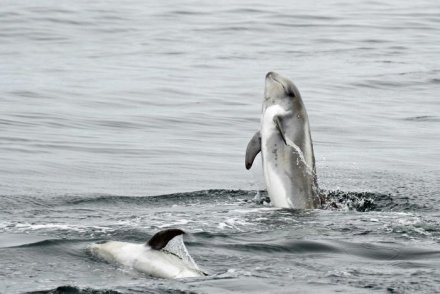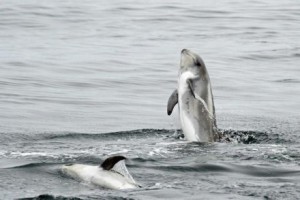They only get one lung full of air for each dive, so the marine predators have developed ways to find and snap up their squid meals as efficiently as possible.
A dolphin species has joined the ranks of animals that take memories of previous hunting expeditions and use them to plan the next.
Risso’s dolphins (Grampus griseus) remember where their prey is, and change the depth and location of subsequent squid-seeking dives accordingly.
As oxygen-breathing marine mammals, they need to efficiently use the lung full of air they have to sustain them on each dive — which sometimes take them 450 metres below the waves.
That Risso’s dolphins seem to plan ahead isn’t all that much of a surprise, University of Western Australia behavioural biologist Stephanie King said.
“Dolphins have complex cognitive skills, [and in captivity] can learn labels for objects and comprehend syntax,” she said.
She added that the work, published in the Journal of Experimental Biology today, “does overall nicely highlight how we can use advanced technology to explore how social or environmental challenges can lead to these advanced cognitive skills in wild animals”.
Using clicks to find prey
Risso’s dolphins are named after Italian naturalist Antoine Risso, and are found in oceans around the world.
They have a short, stumpy face and skin that is often scratched by altercations with prey and socialising with other Risso’s dolphins.
They prefer to feed near coasts, but not in the shallow waters. Rather, they like the deeper offshore water where their favourite food — squid — tends to hang out most.
Like other dolphins, they “see” in the dark depths and find prey using echolocation.
They send out a “click” and wait for the echo to bounce back, which tells them information such as the size of an object and its location.
The deeper a dolphin forages, the faster it clicks.
And as they approach their prey and are just about to strike, the clicks speed up and merge to become a buzzing sound.
But when Risso’s dolphins dive deep, they need to spend less time searching and more time eating — after all, their oxygen can only last so long.
Some animals, such as captive birds and apes, have been shown to plan ahead. Could dolphins in their natural habitat, too, have planning strategies?
A dolphin never forgets (a dive)
To test the question, a European and US team led by Patricia Arranz, an animal biologist at the University of La Laguna in Spain, followed squid shoals and Risso’s dolphins off San Clement Island in California.
Dolphins were tracked using a suction-cup mounted tracker that measured movement and echolocating sounds.
Between 2011 and 2016, the researchers managed to collect data from 37 hunting dives by two dolphins.
And when they analysed the dolphins’ behaviour, they noticed that the dolphins seemed to pull information about previous dives into their next.
As soon as they started swimming down, the animals started echolocating at a frequency corresponding to the depth at which they encountered most squid during the dive prior.
This, Dr Arranz said, “can be interpreted as dolphins recalling information to plan the next foraging dive”.
Then as they swam back to the surface for another breath, the dolphins kept up their clicking, even though they weren’t hunting.
It was as if they were seeing what prey might be out there and sussing out the best location for the next dive, the researchers wrote.
The dolphins then adjusted their strategy on the next dive to accommodate any information they’d gathered.
As well as seeing if other species use memory to steer future dives, Dr King would also like to know more about the duration of the Risso’s dolphin’s memory.
“Would animals remember particular prey patches if they were constant over days or weeks or months? We don’t know that yet,” she said.
Source: radioaustralia








